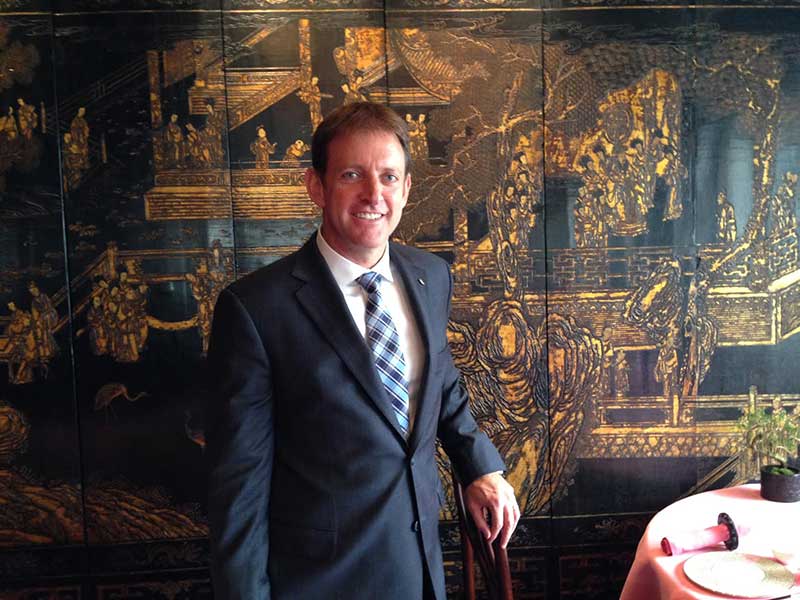
Jeremy McCarthy is well known in the spa world as the Group Director of Spa & Wellness at Mandarin Oriental Hotel Group, overseeing 29 spas across the globe. He is the author of The Psychology of Spas & Wellbeing, and the recipient of the 2016 Debra Simon Award for Leader in Furthering Mental Wellness.
McCarthy started a career opening and operating spas in luxury resort hotels more than 20 years ago- and at the same time started studying psychology. He recently completed his Masters degree in Applied Positive Psychology at University of Pennsylvania in Philadelphia.
On his personal blog, the Psychology of Wellbeing, McCarthy explains:
“People are often curious about why I would study psychology for a career in hospitality, but for me the two are incredibly related. The guests of a spa (or a hotel for that matter) may be attracted by the physical facilities, but their experience is either made or broken by the psychological impact we have on them. How did we make them feel?”
We asked McCarthy some of our usual questions about challenges and joys in the industry, and talked with him a bit about, among other things, the role of psychology in the spa industry.
What is your biggest challenge as a spa director?
There’s an old joke:
Q: What’s the fastest way to make a million dollars in the spa industry?
A: Start with two million.
The biggest challenge in the spa industry is being profitable. Spas are expensive to build and expensive to run. It is a real science to build the right facilities, with the right team, under the right leadership, that tell their story in the right way to be successful. This is a big challenge, but also a part of the fun.
What is your greatest joy?
I love being able to work in a business that is dedicated to making people feel good. More importantly, I love working in a business alongside other people who are dedicated to making people feel good.
What would you like to see more of or more focus on in the spa world?
Although the spa industry talks about being “holistic,” I think most spas tend to be very focused on the physical domain (facilities, treatments, products, etc.) I tend to focus more on the mental and spiritual aspects. To me, what goes on inside someone’s head when they come into the spa is far more important than the products we are using.
What place does psychology or positive psychology have in this world, and where do you see this going?
When I went back to school to pursue my Masters of Applied Positive Psychology, a lot of people assumed I must be preparing to leave the industry. But if spas are places dedicated to impacting people’s wellbeing across body, mind, and spirit, why wouldn’t the scientific study of mental and spiritual wellbeing be the foundation for what we do?
Positive psychology, in particular is a very good fit for the spa industry because it is more about helping people to live flourishing lives as opposed to treating illness or curing anxiety.
What place does technology have in this world and where do you see this going or how do you see it expanding?
Mandarin Oriental Hotel Group has launched a huge “Digital Wellness” initiative around addressing the impact of technology on wellbeing. This is not just a marketing promotion for us, but a key part of our strategy for the decade ahead.
The problem with technology is not that it is bad. It’s that it is too good. We get so much benefit from technology that we sometimes lose sight of the sacrifices we are making along the way. Our goal is to make people a little more mindful about the impact of their technology use on their overall wellbeing and to encourage people to use our spas as a place to take a break from technology, even if for a brief period.
If you could give just one key piece of advice to any aspiring spa directors, what would it be?
Learn how to grow revenue. A lot of people in this industry are fuelled by a passion for wellness but are not knowledgeable about the financial aspects of the industry. For those that do get more engaged with the profit and loss statement, they sometimes get so caught up in controlling costs that they lose sight of the revenue side of the equation. Ultimately, it is the ability to grow revenue that will make someone successful in their career. If you want to earn more money, you have to show that you can bring more money into the business. That’s what the best Spa Directors are paid to do.
What do you like most about your position at Mandarin Oriental?
It is very nice to go to work every day knowing your job is to “be the best.” Mandarin Oriental has a philosophy of quality and continuous improvement that very much aligns with my personal values.
Mandarin Oriental has such a strong spa and wellness culture that it allows me to focus my time on being creative and creating the best experiences for our guests.
Spa Executive magazine is published by Book4Time, the world’s most innovative spa, salon, wellness, and activity management software. Learn more at Book4Time.com



